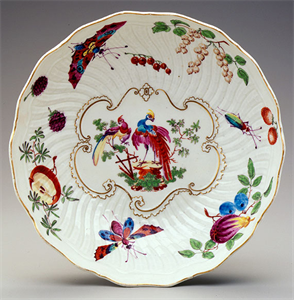
Worcester Porcelain Factory
English, born established 1751
Worcester Porcelain Factory
English, born established 1751
Worcester produced their hexagonal vases primarily between 1765 and 1768. The two vases in the MMFA collection are decorated in what is known as the "Rich Kakiemon" style, which is based loosely on a style of decoration from seventeenth-century Japan characterized by the use of brilliant colors such as opaque blue, transparent yellow, blue-green and yellow-green, brick red, and gold.
Kakiemon pieces usually consist of a central motif of flowers, animals, or birds perched on or beside a tree, accompanied by a narrow floral or diaper border. The Kakiemon style was the source of the banded hedge, partridge, stylized chrysanthemum, and other Japanese motifs found on Worcester porcelains. The first Worcester pieces produced resembled the original, more restrained Kakiemon style, but during the 1760s, Worcester combined these elements with the indianische Blumen patterns of Meissen and created their own elaborate and fantastic designs, which have come to be known as Rich Kakiemon.
English, born established 1751
Worcester Porcelain Factory
English, born established 1751
Hexagonal Covered Vase
about 1765
Object Type:
Ceramic
Creation Place:
Northern Europe, English, Worcestershire
Dimensions:
16 1/4 in. x 7 1/2 in. x 7 1/4 in. (41.28 cm x 19.05 cm x 18.42 cm)
Medium and Support:
Porcelain
Accession Number:
1996.0011.0002 ab
Credit Line:
Gift of Mr. and Mrs. James Lucien Loeb
Worcester produced their hexagonal vases primarily between 1765 and 1768. The two vases in the MMFA collection are decorated in what is known as the "Rich Kakiemon" style, which is based loosely on a style of decoration from seventeenth-century Japan characterized by the use of brilliant colors such as opaque blue, transparent yellow, blue-green and yellow-green, brick red, and gold.
Kakiemon pieces usually consist of a central motif of flowers, animals, or birds perched on or beside a tree, accompanied by a narrow floral or diaper border. The Kakiemon style was the source of the banded hedge, partridge, stylized chrysanthemum, and other Japanese motifs found on Worcester porcelains. The first Worcester pieces produced resembled the original, more restrained Kakiemon style, but during the 1760s, Worcester combined these elements with the indianische Blumen patterns of Meissen and created their own elaborate and fantastic designs, which have come to be known as Rich Kakiemon.
Keywords
Click a term to view the records with the same keyword
Additional Images
Click an image to view a larger version
Related Objects
Click a record to view

Hexagonal Covered Vase
1996.0011.0001 ab
Portfolio List
Click a portfolio name to view all the objects in that portfolio
This object is a member of the following portfolios:
Your current search criteria is: All Object records.

 by Artist (743)
by Artist (743)

